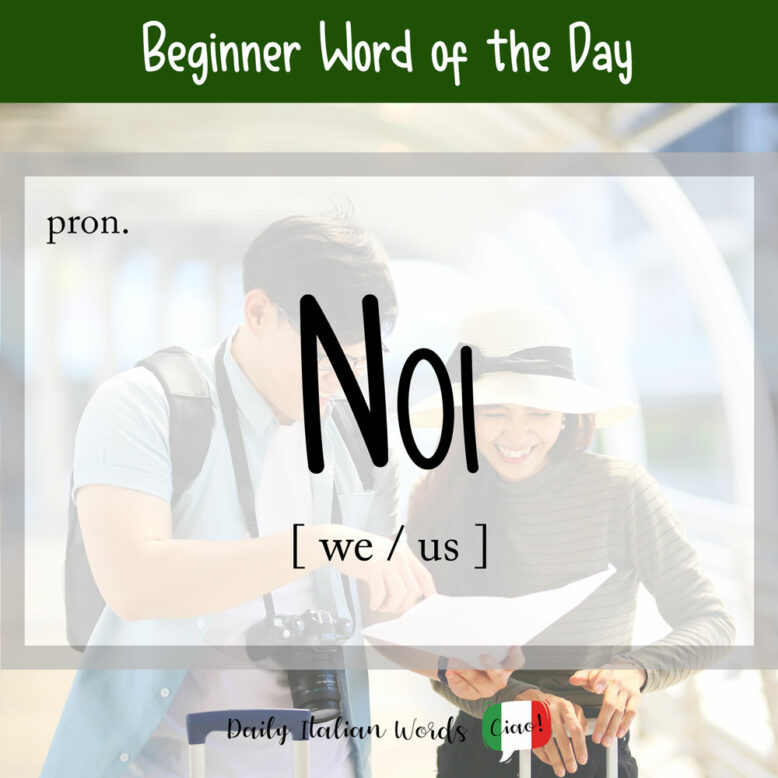When conjugating a verb in a sentence, the first-person plural, we, translates to noi in Italian.

Noi abitiamo in Inghilterra.
We live in England.
In Italian, the person can often be omitted from the sentence because unlike English, the conjugated verb changes for each person, so it becomes obvious what the subject is. For example, abitiamo, the first-person plural, is different from abitate, the second-person plural. For this reason, we could just as easily transform the above sentence into:
Abitiamo in Inghilterra.
We live in England.
In fact, eliminating the person is very common in the Italian language.
Domenica scorsa (noi) siamo andati allo stadio a vedere la Juve.
Last Sunday we went to the stadium to see Juventus.
(noi) Ci siamo divertiti un sacco ieri sera.
We had lots of fun yesterday evening.
(noi) Andremo a trovare i miei cugini sabato prossimo.
We’ll go to see my cousins next Saturday.
You can use noi when you want to avoid confusion if there are multiple groups of people involved (1), when you want to highlight the subject (2) or for juxtapositions (3).
(1) Stasera veniamo a cena noi e gli amici di Carlo.
Tonight we and Carlo’s friends are coming to dinner.
(2) Noi stessi siamo rimasti stupiti dalla sua decisione.
We too were surprised by his decision.
(3) Siamo arrivati prima noi, non loro.
We arrived first, not them.

Noi can be used as the direct object, which in English would translate as us:
Quella ragazza sta guardando noi.
That girl is looking at us.
Noi can also be used to refer to the place you live (house, city or country):
Venite da noi a pranzo sabato prossimo?
Are you coming to us (our place) for lunch next Saturday?
Da noi comincia a fare veramente caldo.
It’s starting to get really hot where we are.
It is common to add su (up) or giù (down) to noi to specify an area in the north or south, in the mountains or by the sea. If the person you’re talking to already knows about the place in question, you can even skip the location name in the sentence.
Su da noi (in montagna) si gela adesso.
It’s freezing at our place now in the mountains.
Venite giù da noi (al mare) il mese prossimo!
Come to our place by the sea next month!
Giù da noi trovi la pizza più buona del mondo.
In the south (where we live) you’ll find the best pizza in the world.
Finally, let’s conclude with a series of compound forms that you’ll likely hear in Italy on a regular basis:
- Detto tra (di) noi / fra (di) noi = between you and me (detto is from the verb dire, to say)
- Rimane fra di noi = it stays between us
- La storia siamo noi = we are history
- Torniamo a noi = let’s get back to us (back to business)
- Veniamo a noi = let’s go to us (listen, talk to me)
- Una cosa tra noi = a shared secret
- Noi due = us two, you and me

Trivia
The song Su di noi performed by Pupo is very well-known and talks about the love story of two people. You’ll hear su di noi quite a lot in the lyrics, which means about us. I found this video that gives you both the Italian and English translations (and Spanish if you’re interested in that language too!).
Mathieu Gasquet was born and raised in Turin in the north of Italy to an Italian mother and a French father. He provides the audio pronunciation for Daily Italian Words.


